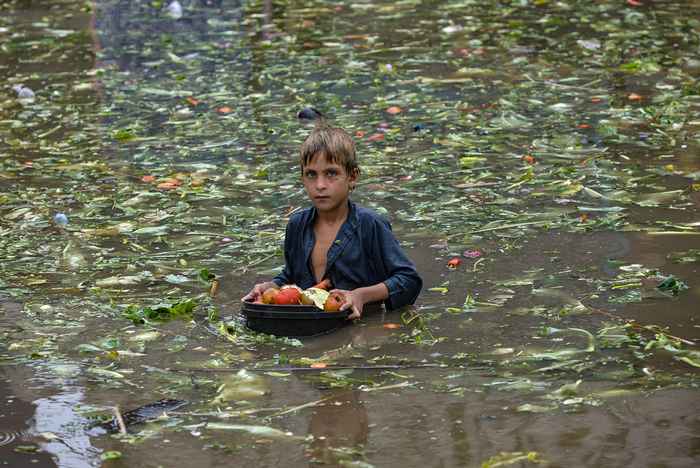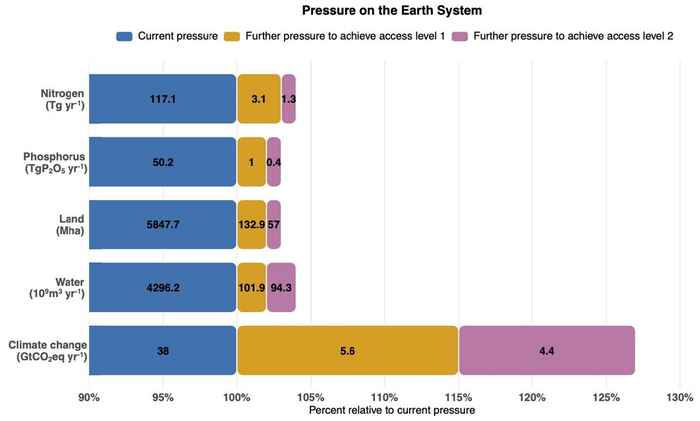Global distributive justice and systemic transformations key to planetary stability, study finds
Researchers find that achieving access to minimum resources and services for all whilst safeguarding the stability of the Earth system requires redistribution and societal transformations
10 November 2022

This new research comes ahead of an associated Earth Commission report due out in early 2023 that will outline a range of ‘Earth System Boundaries’ (ESBs) to safeguard a stable and resilient planet and underpin the setting of science-based targets for businesses, cities and governments. The Earth Commission is the scientific cornerstone of the Global Commons Alliance.
The authors conclude that redistributing resources and transforming society are key to ensuring universal access to basic needs while staying within Earth’s limits. These transformations include redistribution and improvements to water, food, infrastructure and energy provisioning systems.
A few percent versus a third of the world
The study asked: what would be the additional pressures on the Earth system, in 2018, if adequate minimum access to food, water, energy and infrastructure was achieved? The authors looked beyond the international poverty line and instead defined ‘just access’ as minimum per capita requirements that would allow people to lead a dignified life and escape poverty. Their analysis showed an increase of pressures on the Earth’s natural systems, raising greenhouse gas emissions by 26% whilst raising water and land use, and nutrient pollution by 2-5%.
The analysis also showed that these pressures, arising from the poorest third of humanity achieving adequate resource access, equalled the pressures caused by the wealthiest 1-4%. It provides scientific evidence for concluding that in order to achieve societal and environmental goals, it is the wealthy (who appropriate the bulk of Earth’s resources and ecosystems - not those escaping poverty) who need to undergo transformative change. The authors therefore link the ‘Great Acceleration’ of rapid increases in human-driven environmental impacts with a ‘Great Inequality’.

Importance and significance
Lead author, Crelis Rammelt, Environmental Geography and Development Studies at the University of Amsterdam and Earth Commission expert says; “Our research is important because many people assume that meeting the needs of the poorest is possible without major redistributions and transformations in society. We show that in 2018 – so with 2018 levels of inequalities, technologies and behaviors – providing dignified lives for the poor would have led to further crossing of Earth system boundaries, especially for climate. However, it is important to frame these potential impacts in the context of wider inequalities in resource use and environmental impacts today. It is the wealthy who appropriate the bulk of the Earth’s resources, not the poor.”
Co-author Chukwumerije Okereke, Alex Ekwueme Federal University Nigeria and Earth Commission expert says; "The research is significant because it shows that the aching poverty and inequality suffered by people in the Global South can be addressed to provide a meaningful life for all, without transgressing key Earth system boundaries and thresholds. Rather than asking poor countries of the world to tighten their belts or make do without, as some in the North often tend to suggest, the emphasis should be on promoting ideals of global distributive justice and systematic transformations that will enhance wealth and opportunities for the poor.”
Co-author Johan Rockström, Co-Chair of the Earth Commission and Director of the Potsdam Institute for Climate Impact Research says: "While it becomes clear that the poor are not causing the climate problem, it's also clear that we need to solve climate, to solve inequity. Climate impacts are hitting harder on those who lack the resources to cope with them, both internationally and within countries. When it comes to taking action, those who have more means to reduce dangerous greenhouse gas emissions also have a greater responsibility to do so. Stabilizing our climate is in their own interest, also because it means stabilizing societies."
Co-lead author Joyeeta Gupta, Co-Chair of the Earth Commission and Professor of Environment and Development in the Global South at the University of Amsterdam says, "This paper focuses only on one aspect of justice; to ensure minimum access to resources and services for the most disadvantaged. However, our paper shows that with contemporary technology and approaches to production, minimum access cannot be met without reallocating resources, risks and responsibilities; without redistribution and transformation. In upcoming work, we look at other aspects of justice, such as minimizing harm to humans and addressing the root causes of environmental degradation and vulnerability.”
Wendy Broadgate, Global Hub Director (Sweden) for Future Earth says “It is clear that we need to address inequalities and justice to tackle the triple planetary crisis of climate change, biodiversity loss and pollution. This research highlights the deep societal transformations needed to tackle overconsumption. This transformation is essential to secure fair access to the global commons for all, whilst ensuring the stability of the planet. This work is a key contribution to the Earth Commission’s forthcoming report defining safe and just Earth system boundaries.”
Publication details
Crelis Rammelt, Joyeeta Gupta, Diana Liverman, Joeri Scholtens, Daniel Ciobanu, Jesse Abrams, Xuemei Bai, Lauren Gifford, Chris Gordon, Margot Hurlbert, Cristina Inoue, Lisa Jacobson, Steven Lade, Timothy Lenton, David McKay, Nebojsa Nakicenovic, Chukwumerije Okereke, Ilona Otto, Laura Pereira, Klaudia Prodani, Johan Rockström, Ben Stewart-Koster, Peter Verburg and Caroline Zimm: ‘Impacts of Meeting Minimum Access on Critical Earth Systems amidst the Great Inequality’, in: Nature Sustainability (10 November 2022). Doi: 10.31235/osf.io/tj2d3